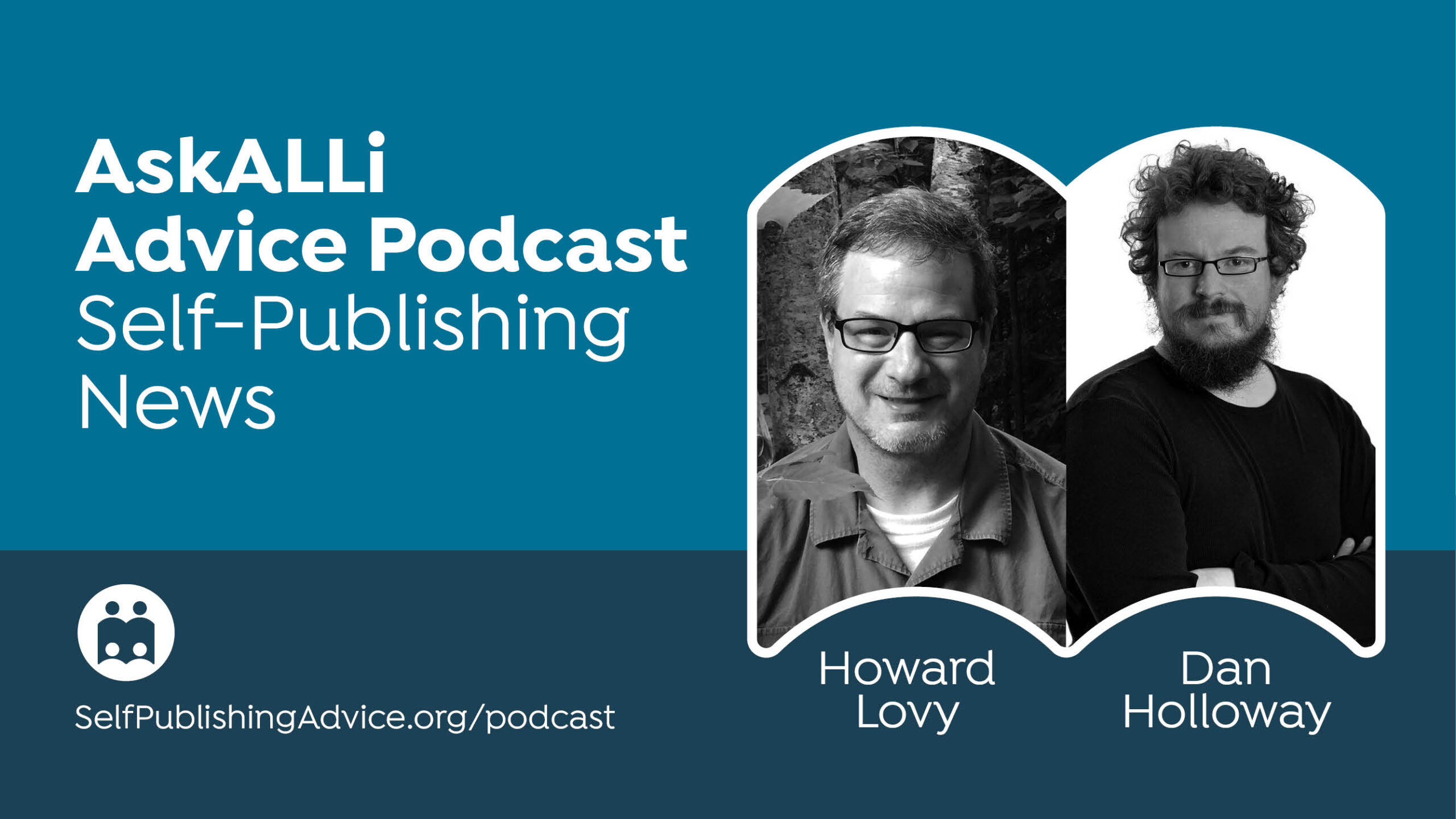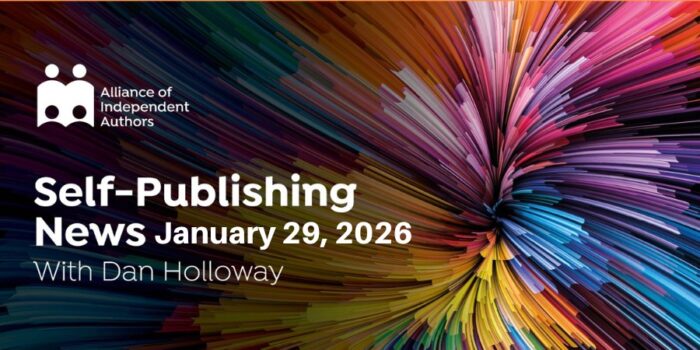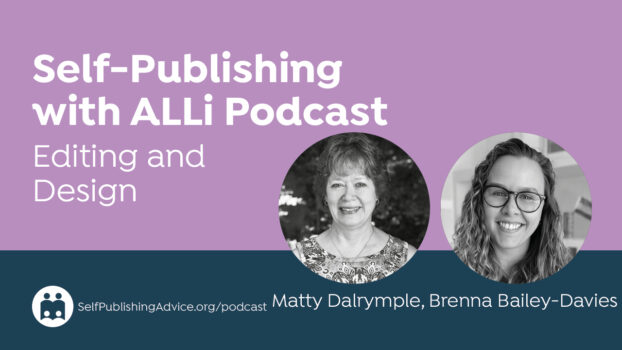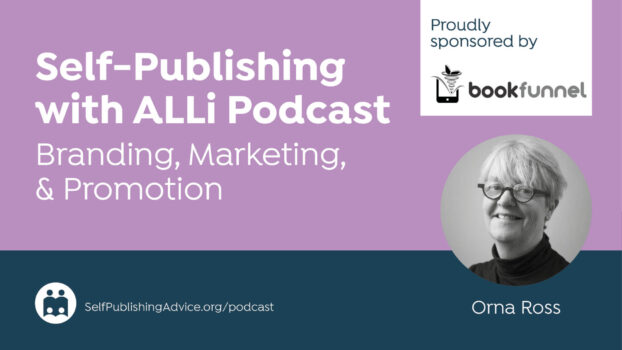There is a worldwide paper shortage just in time for the holiday book-buying season. How are indies coping? Also, artificial intelligence has come to audiobook narration, and what the brief OnlyFans adult-content ban means for indie authors. These are among the topics discussed on Self-Publishing News with Alli News Editor Dan Holloway and News and Podcast Producer Howard Lovy.
Find more author advice, tips and tools at our Self-publishing Author Advice Center: https://selfpublishingadvice.org, with a huge archive of nearly 2,000 blog posts, and a handy search box to find key info on the topic you need.
And, if you haven’t already, we invite you to join our organization and become a self-publishing ally. You can do that at http://allianceindependentauthors.org.
Listen to Self-Publishing News: Paper Shortage, AI, OnlyFans, and More
Subscribe to our Ask ALLi podcast on iTunes, Stitcher, Player.FM, Overcast, Pocket Casts, or Spotify.
There is a worldwide paper shortage. How are indies coping? Also, AI has come to audiobook narration. Listen to the Self-Publishing News #podcast with @agnieszkasshoes and @howard_lovy. Share on XAbout the Hosts
Dan Holloway is a novelist, poet and spoken word artist. He is the MC of the performance arts show The New Libertines Earlier this year he competed at the National Poetry Slam final at the Royal Albert Hall. His latest collection, The Transparency of Sutures, is available on Kindle.
Howard Lovy has been a journalist for more than 35 years, and has spent the last eight years amplifying the voices of independent publishers and authors. He works with authors as a book editor to prepare their work to be published. Howard is also a freelance writer specializing in Jewish issues whose work appears regularly in Publishers Weekly, the Jewish Daily Forward, and Longreads. Find Howard at howardlovy.com, LinkedIn and Twitter.
Read the Transcripts: Paper Shortage, AI, OnlyFans, and More
Howard Lovy: Hello, and welcome to the September 2021 edition of Self-Publishing News from the Alliance of Independent Authors.
I'm Howard Lovy in Traverse City, Michigan, and joining me from Oxford University is ALLi News Editor Dan Holloway. Hello, Dan, how are you?
Dan Holloway: Hi, Howard, and welcome back after the summer.
Howard Lovy: So, what's new with you? Are you still planning for your big half-century, anniversary, birthday extravaganza where you're going to climb great heights and lift great weights, and things like that?
Dan Holloway: I did the climbing heights while we were on break. Yeah, I'm still lifting lots of weights, running a long way, doing memory things. What else am I doing?
Howard Lovy: Now, when is the big 50th birthday for you?
Dan Holloway: I'm doing it next June. So, I've been in training for a year. I've got a year to go, and people can still sponsor me now though. Also, if any food companies who want to sponsor me, I'm always on the lookout for food companies to get their brand out there.
So, yes, what have you been up to? You've had a milestone of your own, I gather?
Howard Lovy: Yeah. Well, I'm about to enter my four-year anniversary of working without a net. I was executive editor at Foreword Reviews, a magazine that reviewed books from indie and small publishers, and four years ago, my publisher announced that they had no more money to pay me. So, since then, I've endured some financial panic, a little ageism, and a pandemic, yet I've emerged with a thriving book editing business and a relaunched journalism career, plus my podcast work for ALLi, and most of my clients are indie publishers and indie authors. So, I'm happy to be part of the indie publishing ecosystem, and happy to be working as well.
Should indie authors be worried about a global paper shortage?
Well, let's move on to the news. First, let's discuss this old-fashioned thing called paper. Apparently, there's a shortfall of this stuff, and among other things, that means the supply of physical books might come up a little bit short this gift season. Tell us what's happening, Dan.
Dan Holloway: Yeah. So, paper has been a problem for a little while. People who regularly read will know I've been reporting on it as a problem in the US for a little while. My understanding of the problem in the US has always been that it's around the paper type and the paper size. So, publishing-suitable paper has to be a very particular measurement and it has to be made of a very particular type of material in order to do all the things that you need your paper to do in a book, so book grade paper.
It's a slightly broader problem that we seem to be facing now, largely around shipping. So, some of this has to do with the general global shipping crisis that in part was fuelled by the Ever Given a few months ago, if you remember that.
So, when the Suez Canal was basically blocked for many days, so ships and pallets and containers, and all the things you need to get things moving around the world, ended up in the wrong place, and ended up queued up for weeks on end.
So, the long and the short of it is that a lot of the printing places in China are finding it very hard to get paper to them, and then once they've printed, to get finished boos off to people. So, that's going to be affecting the Christmas lists, as you say, so a lot of publishers have pushed those dates back.
It's also starting to affect us as Indies. So, IngramSpark are putting some of their prices up to reflect rising costs of paper. The figures I've seen, it's between 3% and 6% that prices at IngramSpark are likely to be going up. So, it's not nothing. Given how tight the margins are on a lot of books, that can eat into quite a lot.
And anyone who's been in the UK, or seen the news in the UK, will know that this isn't likely to be the last rise of such things. Manufacturing in general is having a bit of a nightmare, energy prices in particular are going up, all the sorts of things that drive overheads up are going up.
So, the paper crisis is likely to be the first part of something that could become bigger.
KDP start producing hardback books
Howard Lovy: Now, in somewhat related news, well, I'm not sure if it's related or not, but KDP, which of course indies are very familiar with, they're introducing a hardback option now, I think for the first time. Is this going to have any impact on that?
Dan Holloway: I guess it's very likely to, I'm not sure how many people will be using it, so I'm not sure what the volume is going to be. But it's bound to have an impact.
People seem to like the new KDP hardbacks. There were some photos on ALLi, on the forum, that people have been posting, where they were showing, this is what it looks like if I get my hardback through IngramSpark, this is what it looks like through KDP. And KDP have those nice ribbons at the top, they're not the ribbons that come down and you use as bookmarks, but you know the little silk, there must be a technical name for them that I don't know, the sort of multi-coloured silk things at the top of the books that are just nice little bits of finishing, that hide where the glue is, and the stitching is.
So, they look really nicely produced. It's coming at a time when IngramSpark have also had some issues that people have been raising around their trims. So, some of the trim sizes haven't been perfect and some of the finishing on books hasn't been perfect. So, it's sort of, you might even think, no, I can't even say that. It's come at a perfect time for Amazon, put it like that.
Howard Lovy: Well, I know that, at least anecdotally, a lot of my clients are asking about hardback options, and things like that. They want to produce a good looking, coffee table, type book. Something substantial as a gift, or to give to other people, but it sounds like prices are going to go up for physical books, no matter what, due to circumstances beyond our control. I had no idea that, that one bottleneck in the canal a few months ago had such a ripple effect.
Dan Holloway: It really has, and it’s sort of worrying because print books have done really well during the pandemic in general. It's been one of the surprises. So, it would be a shame if this was the thing that meant that bubble burst, and that print collapsed after having almost made it. It would be like a character in a film, where the plucky character almost makes it through and then doesn't make it at the last minute.
Howard Lovy: Right. Well, that's also the story of my life, as well. We won't get into that.
How will artificial intelligence change book narration?
Well, speaking of danger to print, let's talk about artificial intelligence, and there's news in terms of audiobook narration. I have to admit that I have so many manuscripts to read in my work that my eyes strain, so I'll use the speak-text feature on my iPhone. So, I'll take a walk and listen to a client's book. But right now that narration is just a monotone. The acting quality isn't exactly academy-award winning, but I understand that might change with new AI narration.
Dan Holloway: Yeah. So, this is Ingram again. Ingram have partnered with a company called DeepZen to produce audiobook narration that is powered by AI, and the idea is that it's able to replicate human emotion, or the emotional pitch variants, that you get in order to avoid exactly what you described of really, really monotonous.
I remember when cars first had AI voices, or not AI, but artificial voices back in the 1980s, I think, and they were really, really awful, and it feels like voice generation hasn't come much further than that, but artificial intelligence seems to be helping things on the way.
It's not cheap. It's, I think, around $150 is the upper price, $120 is the lower price, if you have lots and lots of it, per finished hour of narration. But it's not good news…
Howard Lovy: It could also be a real time-saver. It's not a quick thing to record an audiobook, or hire a voice actor, and pay a studio and pay an actor to do all this.
Dan Holloway: No, it's not, and I can absolutely see the attraction.
It's obviously not good news for voice artists.
Howard Lovy: Have you listened to the quality of the voices? Can you tell? Can it pass the Turing test?
Dan Holloway: I can't quite bring myself to. I hear things like this quite regularly in my day job, because I work with people who work on speech recognition and speech generation and artificial intelligence, here in Oxford. It's getting better very quickly now, it's one of those exponential things where it feels like it's going nowhere and then it suddenly gets very much better, very quickly. It's one of those Canary in the coal mine issues for the role of artificial intelligence in the creative industries.
If you look at what happened with Audiblegate, for example, the still very active Facebook group is for authors and rights holders who've been shafted by Audible, and rights holders means voice artists. So, voice artists, like illustrators and like editors, are a key part of the industry.
If it succeeds in voice artists not being a thing anymore, then they're not going to be the last thing disappears, put it like that.
Howard Lovy: Well, speaking selfishly, from an indie authors perspective though, this would drive down the cost and make recording audiobooks a little more accessible, don't you think?
Dan Holloway: Yes, I mean, it would also avoid those slightly awkward split royalty contracts and the kind of agreements you enter into through ACX that always feel as though everything is a little bit tenuous, where you're splitting royalties with your voice actors.
I've always thought if I was going to do an audiobook, I'd record my own, because I wouldn't want to enter into that kind of agreement, I'd be slightly wary of it.
There are two types of indie, there's the indie who likes to have absolute control of everything, and the kind who's much happier just outsourcing everything they can outsource, and this would definitely appeal to the former. It would also, like you say, appeal to anyone on a budget.
Howard Lovy: Right, right. Well, you have this pleasant BBC English voice that no computer could possibly replicate, so you're in no danger.
Dan Holloway: I think BBC voices are highly replicable.
Howard Lovy: Right. Well, that was the idea, so everybody sounds the same, right? No regional accents.
What control do payment providers have over indie authors content?
Okay, well, let's talk about one other thing that's a little bit on the, I suppose, risqué side, and that's Only Fans, and we were talking about this a little bit on Twitter during the break, but give us an update on what's happening. Only Fans, for a while, banned adult content, which made up pretty much all of their content and then went back on it. Tell me the story behind that.
Dan Holloway: Yeah. So, the story behind it was around, and this is something that will be familiar to a lot of people, it's the question of payment provider overreach, I guess, is what I would call it.
So, those of us with long memories will remember, for example, Smashwords ran into this problem in, I looked it up and it was 2012, I'm sure it was more recently than that as well, or maybe we really are just getting very, very old. But in that case, it was PayPal who were trying to flex their muscles, and kicking erotica off the site, and authors were up in arms about it, in large part because they had made Smashwords what it was. Erotica authors were, sort of, at the leading edge of the indie movement, certainly in the early days, they were the ones who were showing that audiences could be created outside of traditional publishing.
And Smashwords had owed its growth to them, and then all of a sudden it was seen as turning its back on them simply because someone at PayPal decided that they ought to. That didn't go down very well, and there was a very successful authors campaign, and it got this overturned, and PayPal even finally said, no, okay, fair enough, do what you want.
But Smashwords has, sort of, never been the same sense. This is one of the things that happens. So, what happened was Only Fans was, it's slightly more shrouded in secrecy because they haven't said exactly what it was, just that it was their payment provider partner decided that they didn't want this content on the site. They didn't give a reason, it may have been to do with their verification software, or it may have been a moral stand, but either way it was, again, similarly with Smashwords, the content that made the site what it was being pulled, and content creators were not pleased about it. Especially as, when you sign onto a site like that, you sign on because the terms and conditions are very clear up front. It's very clear what you can and can't do, and it felt like they were being changed with little or no notice, and not even changed by the site, but being changed by their partners.
Howard Lovy: Right? Was that PayPal, or any other?
Dan Holloway: No, this is what I mean, we don't really know. I think people were throwing things around about MasterCard, but I'm not sure that we a hundred percent know that it was MasterCard.
Howard Lovy: Only Fans is basically individuals putting their own adult content out there to make some money, right?
Dan Holloway: Yes, it's like Patreon. It works very similarly to Patreon. So, yes, it's streaming content rather than static content, or I think it can be both, but it has streaming content in a way that Patreon doesn't so it can be live interaction, but it's the same principle. People subscribe to you, and every time new content is uploaded, they pay.
Howard Lovy: So, indie authors might be listening to this thinking, okay, well, I don't take off my clothes on camera, what does this have to do with me?
Dan Holloway: Well, to finish the story, I guess, again, there was a backlash. Only Fans withdrew the ban, but as has subsequently emerged, a lot of content creators have started forming their own collectives, have started working on their own sites, pooling their resources to create something else. So, that's one of the issues is that, when platforms do this, they can quite often damage themselves quite badly and not recover from it, especially if there is a feeling amongst creators that the platform has turned its back on the people who made it what it was. So, there's that.
There's a question of overreach. Should the payment partner of a platform have the right to decide what's displayed on that platform, rather than the people who actually own the platform deciding what's on there? So, that's the other thing, and it makes things very uncertain if you're putting content on a site but it's not the site owners who decide if that content stays there.
Yes, the rug gets pulled out from under you. But the other thing that was really interesting this time around that was very different from 2012, is there was a lot of talk about crypto, and about if this is going to be a systemic problem that creators are always going to be at the mercy of these big finance companies, then is this going to accelerate the move to people using blockchain and decentralized currencies, because that seems to be the only way to avoid this, and this is what people have started working on. So, that's something interesting.
Howard Lovy: Back to Blockchain again, it keeps popping up.
Dan Holloway: It does, and the one thing it does is gets around this problem of someone else pulling the rug. There are fewer people who can pull the plug on your content.
Howard Lovy: Right. Exactly. Okay, I think that's all the time we have for today.
So, good luck with your physical endeavours. I get tired just reading about it. I follow you on social media and keep up with all your exploits. Don't get injured, we're not as young as we used to be!
Dan Holloway: I won't get injured, don't worry.
Howard Lovy: Okay. And I'll talk to you next month.
Dan Holloway: You take care. Bye.
Howard Lovy: You too. Bye.





